What do you think was the biggest story of 2014? Was it when Kim Kardashian attempted to #BreakTheInternet, or when nude photos of Jennifer Lawrence were leaked via 4Chan? Or were you part of the statistic that indicated Vhong Navarro as the most searched person on Google in the Philippines?
It’s easy to say that the most viral stories are the most important ones, but we at MP-KNN went beyond likes and shares and came up with what topics and issues we and our readers cared about this year. These involved the youth, journalism and social media, which are part of our advocacy’s focus, as well as sexual and reproductive health and rights (SRHR) and technology.
Through our social media channels, we shared stories and our thoughts on body image, gender-based discrimination and crimes, and responsible online sharing or netiquette. We called out cultural biases, and recognized initiatives in youth participation and development work.
We sure celebrated big victories like the passage of the Reproductive Health Law in April, but we were also aware and quick to point out the small battles people face everyday on the streets, on the Internet and in their homes.
In no particular order, here are the top eight stories we cared about in 2014:
Issues on Sexual and Reproductive Health and Rights (SRHR) in Asia: APCRSHR 2014
In January 2014, Mulat Pinoy–Kabataan News Network had the privilege of being the official Social Media Coverage team of the 7th Asia Pacific Conference on Reproductive and Sexual Health and Rights (APCRSHR) 2014. Held this year at the Philippine International Convention Center (PICC) from the 21st to the 24th, APCRSHR was an essential event for the continued development of global awareness regarding reproductive and sexual health and rights, with a primary focus on trends, statistics and strategies in Asia and the Pacific. Over the years, it had been held in several Asian nations, and the intercultural exchange of ideas and methodologies enriched all of its participants.
MP-KNN covered and curated content from the conference and published stories on comprehensive sexuality education, SRHR for indigenous peoples, differently-abled, youth and adolescents, and engaging men in defying social constructs and supporting family planning methods. By exchanging statistics and best practices in different countries, participants at APCRSHR were exposed to insights and experience that could potentially solve SRHR issues back home.
An exciting part of our coverage was seeing more people aware and engaged with the topic over social media. For six months before and after the event, the hashtag #7APCRSHR made almost 1.8 million impressions over Twitter, thanks to 6,278 tweets from 669 participants!
To revisit content from our coverage, you may go to our Blog or our YouTube Channel.
Latest Data on #PinoyYouth: YAFS 4 launch
This year saw the launch of the 2013 Young Adult Fertility and Sexuality Study (YAFS 4), the fourth installment of the country’s primary source of information on sexual and non-sexual risk behaviors and its determinants in the Philippines at the national and regional levels. Conducted since 1982 by the University of the Philippines Population Institute (UPPI) and the Demographic Research and Development Foundation, YAFS 4 was 10 years in the making. It was definitely worth the wait, though, as it was the most representative national survey thus far on Filipino youth, interviewing around 20,000 people aged 15-24: As additional context, the study cited that by then, there were over 19 milllion young Filipino adults throughout the country.
This latest study also expanded its range of topics to include Health and Lifestyle (from dieting and body image, and mental health), and the section on Media included new forms of communication technologies like social media, cyberbullying and tech-mediated sexual behavior: concepts that were not well-developed yet in 2002 when the last survey was conducted.
Some of the interesting results you can find in their website include the youth becoming less involved in drugs, alcohol and smoking, yet are considered as high consumers of junk food and carbonated drinks. Almost 80 percent of young Pinoys also report that their first sexual encounter was unprotected. The Philippines has seen a rise in incidences in teenage pregnancy: 13.6 percent of girls aged 15-19 found to be pregnant for the first time or already mothers–double the incidences in 2002 at 6.3 percent.
YAFS 4 is a gold mine of important data about the youth, and should come in handy for organizations doing initiatives for them.
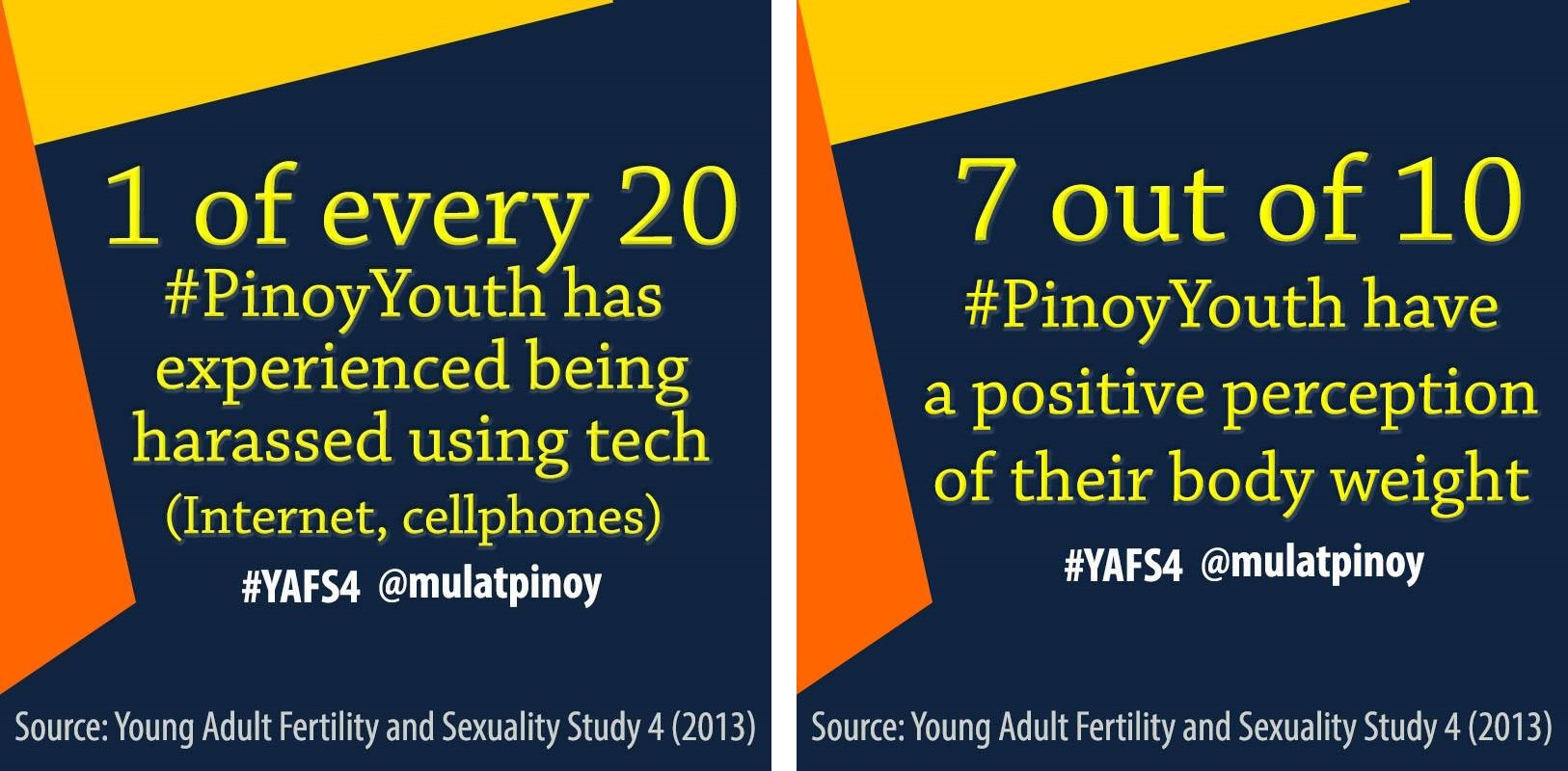
Some of the new sections in the YAFS 4 include youth’s perception of their body image and online behavior like cyberbullying. | Infographics by Rocel Ann G. Junio
Teenage Pregnancy: This generation’s most defining issue
This leads us to teenage pregnancy: something the National Youth Commission (NYC) believes to be “fast becoming the most defining and one of the biggest concerns of this generation.” Commissioner Perci Cendana says the Philippines is a gold medalist among Southeast Asian countries, with the highest rate of increase according to the latest surveys, and it is “recognition” that we shouldn’t be proud of. “What is more alarming is while the country is registering a spike in incidence, the rates of teenage pregnancy in other countries in the region are actually declining. This simply means that we are not doing enough. This is a great disservice to young women and the youth,” he says.
In June 2014, we launched our eKapihan Series with an episode on teen pregnancy, where our guests talked about the whys and hows of the situation in the Philippines, and its effects on the physical, emotional and psycho-social development of Filipino youth. The videocast featured a lively discussion between experts Dr. Rosette Nancho of Society for Adolescent Medicine of the Philippines, Inc. (SAMPI), Ms. Richie Parr of MLAC – Psychological Services for Well-Being, Pastor Vernie Compas of Interfaith Partnership for the Promotion of Responsible Parenthood (IPPRP), and a youth representative, teenage mom Eunice from Community and Family Services International.
For World Population Day 2014 on July 11, we joined the United Nations Population Fund, the Commission on Population and other allies in looking for ways to effectively Invest in Young People, including education and services related to SRHR, in support of the largest-ever population of youth worldwide.
We do hope that efforts made to make teenagers, parents, teachers and other stakeholders aware of and act on the adverse effects of early and unplanned pregnancy can reduce the statistics and strip us of the ‘gold medal’ in this aspect.
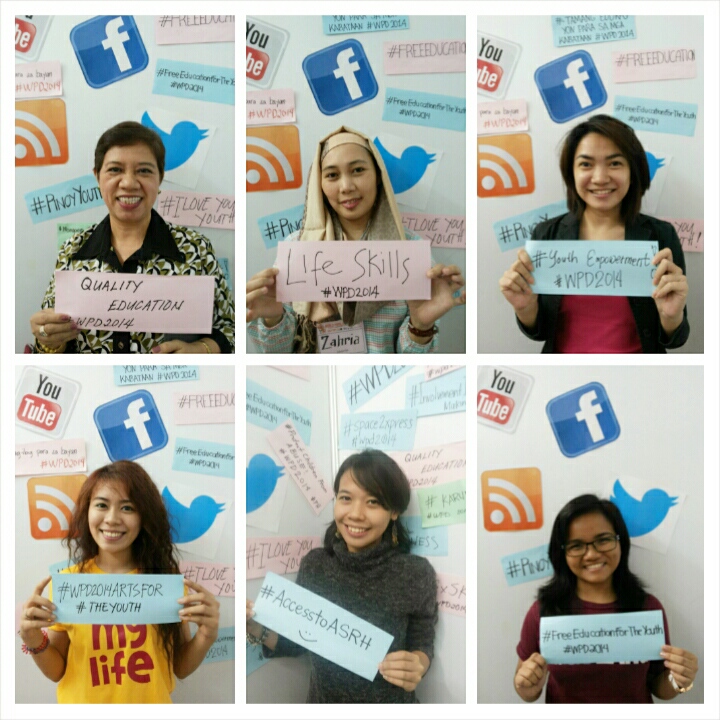
Some of the issues governments and institutions need to invest in, according to our guests during World Population Day 2014 at SM Megamall, Pasig City. | Photo by MP-KNN team and Youth Reporters
Reproductive Health Law: Getting the work done
After a 14-year wait since the Philippine Legislators’ Committee on Population and Development (PLCPD) made the first step to push for reproductive health policies, the Reproductive Health bill was finally signed into law by President Benigno S. Aquino III in December 2012 and upheld constitutional by the Supreme Court in April 2014.
Despite this victory, though, Filipinos have yet to witness the real impact of the law on their lives.
The Department of Education has taken some steps to incorporate a comprehensive sexuality education (CSE) module into the K-12 curriculum, but teachers and parents of students show some level of reluctance and discomfort, even with widespread efforts in research-based training and awareness. MP-KNN reporters Nicko de Guzman and Patrisha Torres find that residents in a neighborhood in Quezon City believe parents, and not teachers, should be the ones to teach sexuality education to their own kids.
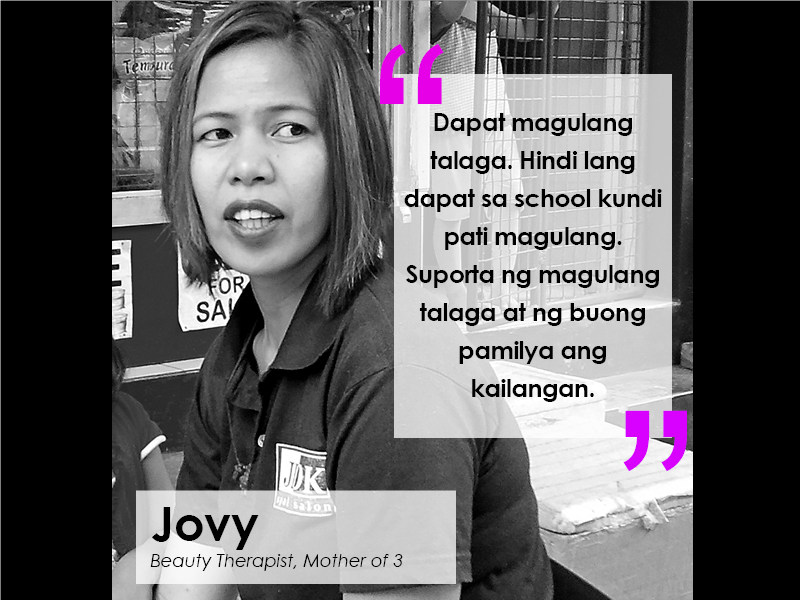
Jovy is one of several residents in a neighborhood in Quezon City who believe that parents must also teach sex education to their children. | Photo essay by Nicko de Guzman and Patrisha Torres
Aside from CSE, women and the youth’s access to reproductive health services and information are crucial points of implementation as well. Does a wife need her partner’s consent when availing of RH services? How about adolescents who need information about their sexual lives but cannot talk to their parents about it? Do local governments have enough manpower and resources to reach out to far-flung communities, indigenous peoples, and vulnerable populations? All these are discussed concisely by Beth Angsioco of the Democratic Socialist Women of the Philippines (DSWP) and nurse Alvin Cloyd Dakis, Country Coordinator, of International Youth Alliance on Family Planning in the second eKapihan Series episode on the Reproductive Health Law.
Year 2015 will be a challenging year to provide SRHR services to 100 million Filipinos, but it’s high time we get the work done.
Gender-based discrimination and crimes: #EndRapeCulture #VAW
This year, we were also very vocal about gender-based discrimination and crimes, including Violence Against Women (VAW) and rape, especially at a time when many people still think and feel that these are normal and that nothing can be done about them.
You would think it’s “normal” when you see a shirt that reads “It’s not rape; it’s a snuggle with a struggle” sold at the country’s biggest mall chain. Writer Karen Kunawicz felt compelled to post a photo of the shirt, which for her was a distasteful and inappropriate way to justify rape. SexAndSensibilities.com said it well: “Justification of rape and trivializing the need for consent in the guise of humor does nothing but promote #rapeculture.”
The photo went viral (over 5,000 shares and 1,900 likes as of this writing) and was picked up not only by local news agencies but the international press as well. According to The Independent, Karen wrote this after posting the image: “I count myself among those who worked really hard especially in the 90’s for the rights of girls and women so it really got me upset. I was shaking when I took it. I wanted to throw up.”
In the same week, another photo caused backlash against a local clothing company for its brand of entertainment. At Bench’s “The Naked Truth” fashion show, local actor Coco Martin walked down the runway with a lady on a leash appearing to be his “pet.”

Coco Martin and his ‘pet’ were said to have drawn applause and cheers from the crowd at The Naked Truth | Photo and in-caption by StyleBible.ph
We said this in September: while we continue to tell young boys and girls that we do not have to subscribe to the idea of ‘perfect body’ fed to us by mainstream media on a daily basis, there are people and brands who push the other way with distorted ideas of gender stereotypes and, we dare say, basic humanity.
Stacy of ThePlumPinay.com said, “If we continue to tolerate this form of ‘entertainment,’ before we know it, our society would be watching live porn right before their eyes and be so completely blinded and numbed by the media to see it as harmless amusement. Heck, it’s happening now—a lot of people aren’t even able to tell what can harm us as a society with the kind of sex-obsessed culture we are creating. We’re becoming more and more reckless, not considering the values we impart to the youth who will be left to run this world when the future comes. Is this what marketing has come to? Degrading and sexually objectifying human beings for the sake of profit?”
Following this, we created campaigns on #RapeMyths and for International Day for the Elimination of Violence Against Women. We affirmed that there is a need for people, especially the youth, to be aware that certain beliefs must be deconstructed if not completely disavowed.

A series of infographics for the International Day on the Elimination of Violence Against Women | Infographics by Rocel Ann G. Junio
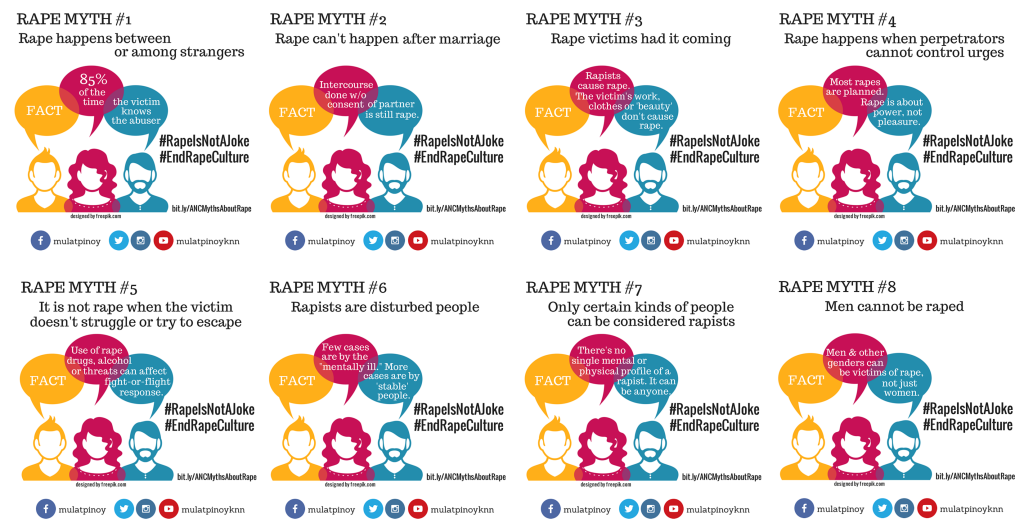
#RapeMyths campaign produced by MP-KNN in light of events justifying #rapeculture | Infographics by Rocel Ann G. Junio
Netiquette: Responsible consuming and sharing online
Indeed, the web and social media are so powerful it can spread valuable information to uplift people, and can also degrade and damage when used inappropriately.
We’re big on #netiquette, the correct and acceptable way of communicating on the Internet. Some netiquette blunders of this year included a 14-year-old girl tweeting a “terrorist threat” to American Airlines. The company took the matter “very seriously” and asked the FBI to intervene. The tweet got Sarah an additional 20,000 followers minutes after AA replied to her, but it resulted in her arrest as well.

American Airlines took this teen’s terrorist joke tweet “very seriously” and immediately asked for an investigation.
Another case that caught our eye was when rape survivor 16-year-old Jada became a meme after her alleged assailants posted a photo of her after the assault. A meme is a concept that rapidly spreads from person to person via the Internet with or without content creation or participation, and in the case of Jada, her photos “inspired” the #JadaPose (how she was askew after passing out), which spread out alongside the original photos revealing her face and body. She thought there was no point at hiding her identity, and stood against rape culture and cyberbullying with her own #IAmJada pose.
“As word spread about the #jadapose meme, messages of support have poured in,” CNN reported. There were people calling out others who think rape isn’t funny, and there were those who suggested developing a culture of empathy to counter rape culture. An essential thing to note was: “When online abuse goes viral, it doesn’t mean the pain is virtual — and the solution isn’t one size fits all.”

Rape survivor Jada made a ‘counterpose’ and a hashtag #IAmJada to oppose a slew of photos online doing the #JadaPose
Not even the most famous people in the world are free from abuse online. Even the likes of actress Jennifer Lawrence (from the Hunger Games franchise) have no control over how the Internet can possibly take advantage of them.
In September, nude photos of Lawrence and several other actors were published via the online forum 4Chan. There seemed to be good evidence that the 4Chan user made the hacking spree to earn from it, but we are unsure if anyone bought them after the online backlash that came after it.
Lawrence finally broke her silence in an interview with Vanity Fair. “Just because I’m a public figure, just because I’m an actress, does not mean that I asked for this… It does not mean that it comes with the territory. It’s my body, and it should be my choice, and the fact that it is not my choice is absolutely disgusting. I can’t believe that we even live in that kind of world,” she declared.
“It is a sexual violation. It’s disgusting. The law needs to be changed, and we need to change,” she said. “That’s why these websites are responsible. Just the fact that somebody can be sexually exploited and violated, and the first thought that crosses somebody’s mind is to make a profit from it. It’s so beyond me. I just can’t imagine being that detached from humanity. I can’t imagine being that thoughtless and careless and so empty inside.”
There there, JLaw. We still think you’re classy and awesome, and a good example for boys and girls the world over.
Journalism for the youth, by the youth
As we went on sharing stories and tips on how to be responsible sharers online, we were also training high school and college students from our partner schools to become our new batch of MP-KNN reporters. MP-KNN’s merger in 2013 led to the revival of youth bureaus all over the country. In May 2014, 16 youth reporters from schools in Laoag to Davao underwent the First National Multimedia Workshop of MP-KNN.
Since the workshop, the youth reporters have been creating stories that they feel are important to the youth. Their stories come in the form of articles, photo essays, infographics and videos, and focus on stories from their communities. Some of their stories are picked up by the mainstream media, aside from being published at the MP-KNN website. The future of journalism in the country is bright, and we have never been prouder!
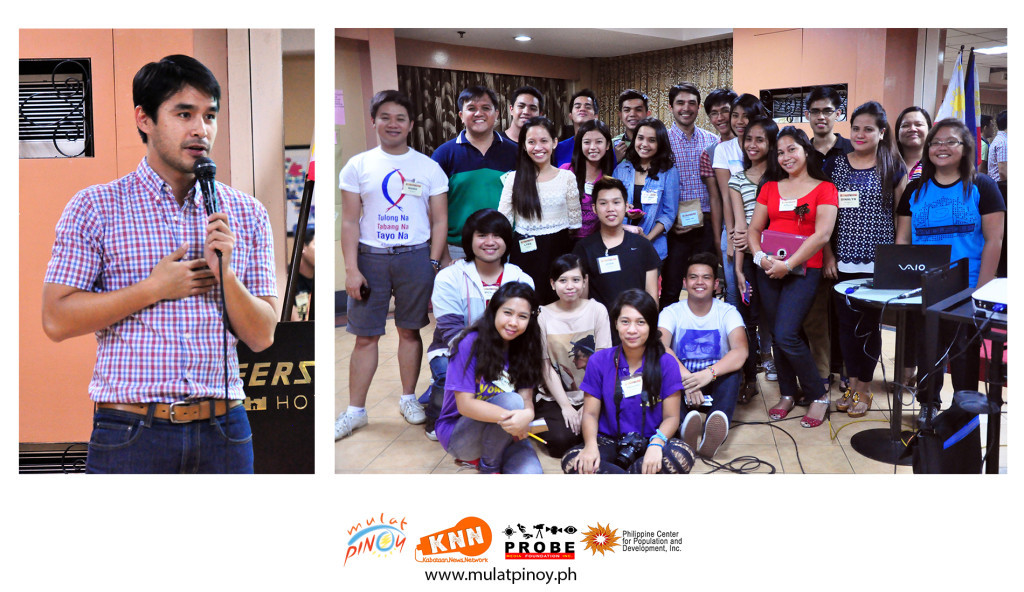
Former KNN host and reporter Atom Araullo delivers an inspirational message to the new batch of MP-KNN youth reporters. | Photos by Rocel Ann G. Junio
Metrobank Foundation and Probe Media Foundation, Inc. also organized #JOYLectures in several schools in Manila, Baguio City, Dumaguete City, and Davao City. The Lecture Series in Journalism featured Journalist of the Year awardees Jarius Bondoc, Malou Mangahas and Jiggy Manicad, who were generous and enthusiastic in sharing their experience in the industry and interacting with students.
As we expose communication and journalism students to the best practices in journalism, we hope they keep their drive going and the lessons from the veterans close to their hearts.
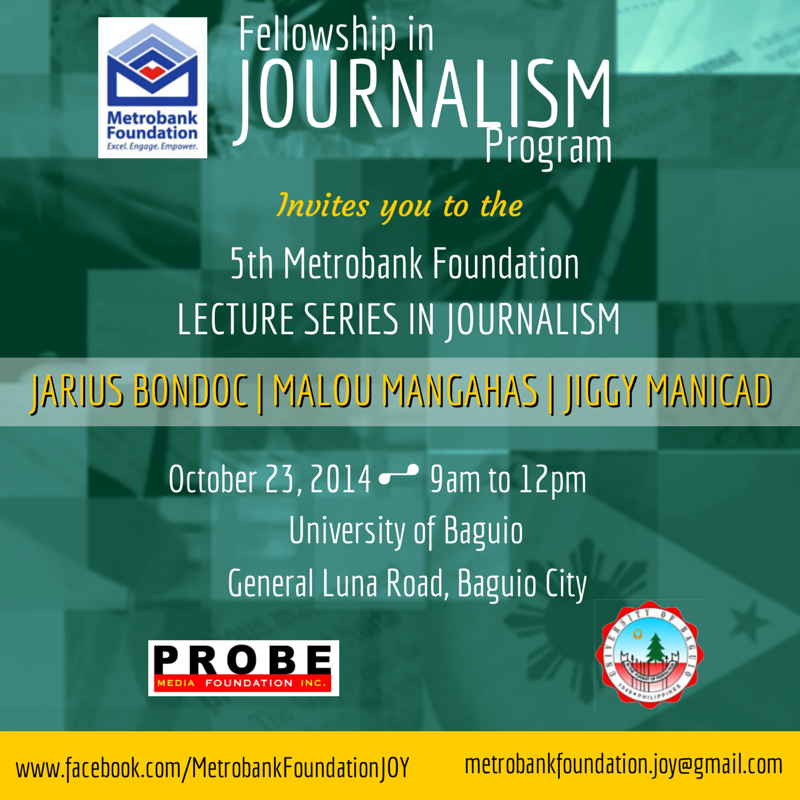
PMFI and Metrobank Foundation toured the country to bring exemplar journalism to students through the Lecture Series in Journalism.
Tech for development: DSDS 2014
As heavy users of social media and technology, we at MP-KNN are excited about how these can help promote not just our own advocacies but development work as a whole. We are happy to provide live social media coverage for partners, and we’re thankful to get recognition for it.
At the first Digital Strategies for Development Summit 2014 held in October, we met and shared quotes from like-minded individuals and organizations, as well as experts in data, emerging and collaborative technologies, and technology for the masses. They imparted best practices in initiatives for youth, education and employment, governance, social innovation and enterprise, health, and disaster and climate management. That’s where we realized how those doing development work can take advantage of anything digital to create compelling campaigns and stories at only a fraction of the cost.
Let’s take advantage of our hyperconnectivity and use it to help people and share information, especially now that the new normal demands it. We just need to get more connected with tech people and organizations who can help facilitate this. And it is definitely something we’re looking forward to in 2015.
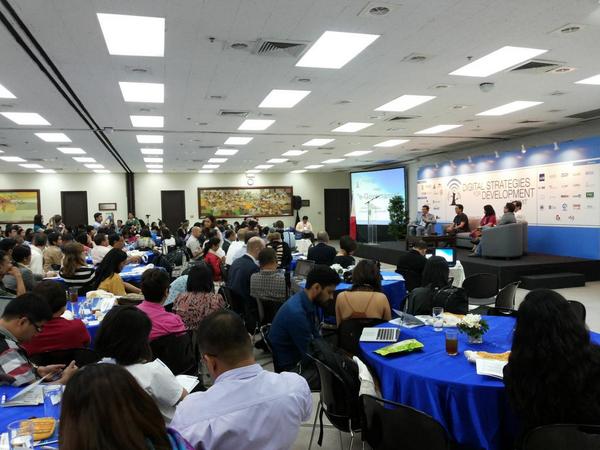
Over 400 participants joined the first Digital Strategies for Development Summit 2014 | Photo by Regina Layug-Rosero
How about you? Any stories that you deeply cared about in 2014? Share your thoughts below!






